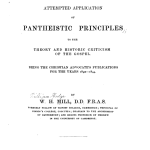
Today I want to discuss chapters 3 and 4 of Fleming Rutledge’s book Crucifixion. (I am skipping over the excursive chapter in between on Anselm because I don’t have much to add to her discussion; see the last post here)
Chapter 3 is about “The Question of Justice” – why did Jesus have to die? Rutledge rightfully emphasizes the focus on justice in the OT. She goes further than this to talk about how forgiveness and restitution is really achieved.
Forgiveness in and of itself is not the essence of Christianity, though many believe it to be so. Forgiveness must be understood in its relationship to justice if the Christian gospel is to be allowed its full scope. (115)
She gives the important example of life after Apartheid – one cannot “forgive” without a means for sustaining a new system of justice (see 116). This is absolutely right, something Miroslav Volf has emphasized as well. Indeed, Rutledge offers this quote from Volf: “The cross is not forgiveness pure and simple, but God’s setting aright the world of injustice and deception” (126).
God seeks not just to use the cross as a magic wand to “forgive” – no, the death of Jesus is the center of God’s plan to overturn an unjust world. I am not sure, though, Rutledge really explained how the cross in particular achieves (or begins) this.
Chapter 4 is about “The Gravity of Sin.” I absolutely commend the fact that Rutledge wants to give due attention to the topic of sin. Far too few studies of atonement in the NT give proper consideration of this subject. From the start, Rutledge emphasizes that the NT focuses on “Sin” (as an entity) and not “sins” (as wrong-doings) (see 168). She is obviously throwing in her lot with Lou Martyn – I think to the extreme, unfortunately. While there are many NT scholars who recognize that sometimes Paul interpreters sin as a entity (e.g., in 1 Corinthians), she pushes to one side almost entirely. In her own words:
Sin is not so much a collection of individual misdeeds as it is an active, malevolent agency bent upon despoiling, imprisonment, and death – the utter undoing of God’s purposes. (175)
Two questions – is this true outside of Paul? Also, why does Paul himself use the plural so frequently, if this is the case? (e.g., Rom 4:7; 7:5; 11:27; 1 Cor 15:3; particularly 15:17). Rather, there seems to be an important dialectic here, Sin, yes, is our monster (as the old confession goes), but Paul equally reminds his readers they are guilty of their own sins (Gal 1:4). That is, sinners are somehow equally victims of Sin and self-inflicted victims – their guilt is truly their own. Note how clear it is in Ephesians 2:1: “You were dead in your transgressions and sins.” Also, I am no expert, but Hebrews seems to me to be bent towards viewing sin(s) in a way much like the Old Testament – personal covenantal infractions that lead to guilt. How do we integrate different canonical voices?
Perplexingly to me, she turns at the end of the chapter to recover some balance, acknowledging that sin is both “responsible guilt” and “an alien power” (181). Then, yet again, she goes on to focus on “Sin as Power” (188ff). Perhaps this represents the convoluted discussion of Sin/sins in the biblical tradition. It is certainly worth further study.
Next time, we will continue into her chapters on biblical motifs related to the death of Jesus.











